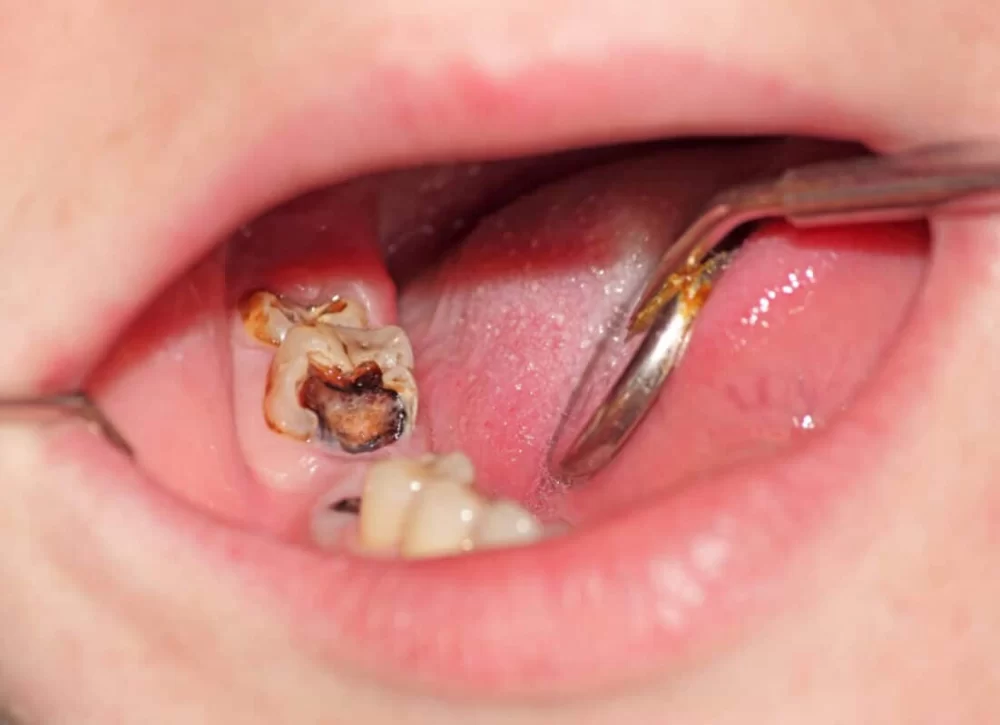
How Untreated Tooth Decay Leads to Tooth Loss
- 1. What Is Tooth Decay?
- 2. The Importance of Early Treatment for Tooth Decay
- 3. Consequences of Untreated Tooth Decay
- 4. How to Prevent Tooth Loss from Decay
- 5. Real-Life Case: A Tooth Lost to Untreated Decay
- 6. Take Action: Protect Your Teeth Today
1. What Is Tooth Decay?
Tooth decay, also known as dental caries or cavities, is a process in which the hard surface of your teeth, known as enamel, breaks down due to the acids produced by bacteria. These bacteria feed on sugars and starches left in your mouth from food and drinks, producing acids that gradually erode the enamel. If left untreated, tooth decay can lead to more severe problems, including pain, infection, and even tooth loss.
2. The Importance of Early Treatment for Tooth Decay
Early detection and treatment of tooth decay are essential to prevent it from progressing. When treated in the early stages, tooth decay can often be reversed with proper care, such as fluoride treatments and fillings. Delaying treatment allows the decay to worsen, leading to deeper cavities, more extensive damage, and the need for more invasive procedures like root canals or even extractions.
3. Consequences of Untreated Tooth Decay
If left untreated, tooth decay can lead to serious complications, including:
- Tooth Infection: As decay progresses, it can cause the tooth to become infected. This may lead to an abscess, a painful pocket of pus that forms around the tooth. An infection can spread to other parts of the body, leading to more serious health issues.
- Tooth Loss: When tooth decay reaches the nerve of the tooth, the tooth becomes severely damaged and may need to be extracted. This is often the final stage of untreated tooth decay.
- Bone Loss: If the decay leads to an infection, it can spread to the jawbone, causing bone loss and affecting the alignment of surrounding teeth.
- Pain and Sensitivity: As the decay deepens, it can cause significant pain and sensitivity, making it difficult to eat or drink hot or cold foods. The pain can often become unbearable, requiring immediate dental attention.
4. How to Prevent Tooth Loss from Decay
Preventing tooth loss from decay starts with good oral hygiene habits and regular dental visits. Here are some key steps to prevent tooth decay and avoid the risk of tooth loss:
- Brush Twice a Day: Use fluoride toothpaste and brush your teeth at least twice a day. This helps remove plaque and bacteria before they can cause damage.
- Floss Daily: Flossing helps remove food particles and plaque between the teeth and along the gumline where a toothbrush may not reach.
- Limit Sugary Foods and Drinks: Sugary foods and drinks feed the bacteria that cause decay. Try to limit your intake of sweets, sodas, and other sugary foods.
- Visit Your Dentist Regularly: Regular dental checkups allow your dentist to catch tooth decay early and provide timely treatment to prevent it from getting worse.
- Use Mouthwash: Antibacterial mouthwash can help kill harmful bacteria in your mouth, reducing the risk of decay and gum disease.
5. Real-Life Case: A Tooth Lost to Untreated Decay
Consider the story of Sam, a 40-year-old man who had been ignoring a small cavity in one of his back teeth. Over time, he experienced increased sensitivity and mild pain but did not seek dental care. By the time he visited his dentist, the decay had spread to the root of the tooth, causing an infection that led to the tooth’s extraction. Sam’s case highlights the importance of addressing tooth decay early. Had he treated the cavity sooner, he could have saved his tooth and avoided the pain and cost of an extraction.
6. Take Action: Protect Your Teeth Today
Don’t wait for tooth decay to progress to the point of tooth loss. Take action now to protect your teeth by adopting good oral hygiene practices and scheduling regular dental visits. If you suspect that you have tooth decay or are experiencing tooth pain, don’t delay in seeking treatment. Visit Dentistry Toothtruth for expert advice, affordable dental care options, and to book an appointment with a trusted dentist near you.







 Westgate Dental Arts
Westgate Dental Arts Coventry Family Dental
Coventry Family Dental Familia Dental
Familia Dental Dr. Daniel S. Fife, DDS
Dr. Daniel S. Fife, DDS Dentistry At Suburban Square: Michael I. Wollock, DMD
Dentistry At Suburban Square: Michael I. Wollock, DMD Comfort Care Dental
Comfort Care Dental The Importance of Oral Health Education During Pregnancy for a Healthy Pregnancy
The Importance of Oral Health Education During Pregnancy for a Healthy Pregnancy Why Skipping Dental Checkups Can Lead to Bigger Oral Health Problems
Why Skipping Dental Checkups Can Lead to Bigger Oral Health Problems Advantages of Porcelain Dental Restorations
Advantages of Porcelain Dental Restorations Best Tips for Brushing Your Teeth Properly for Healthy Gums: Essential Techniques for Oral Health
Best Tips for Brushing Your Teeth Properly for Healthy Gums: Essential Techniques for Oral Health How Can Diabetes Cause Tooth and Gum Problems? Preventing and Managing Oral Health Issues
How Can Diabetes Cause Tooth and Gum Problems? Preventing and Managing Oral Health Issues Healthy Habits for Promoting Good Oral Health and Hygiene: Tips for a Healthy Smile
Healthy Habits for Promoting Good Oral Health and Hygiene: Tips for a Healthy Smile